An Examination of the Primary Sources of Law in the Kenyan Context
VerifiedAdded on 2021/11/09
|10
|3944
|305
Report
AI Summary
This report provides a comprehensive overview of the sources of law in Kenya, analyzing the Constitution, common law, customary law, Acts of Parliament, and statutory law. It explores the roles of the legislature, judiciary, Senate, and executive in law-making and application. The report further discusses the application of statutory and common law in justice courts, the effectiveness of Kenya's legal system, including current reforms, and the impact of law on businesses through company, employment, and contract law. The discussion also includes an evaluation of the Kenya's legal system and some of the hindrances to the country and its people. The report highlights key legal principles and their practical implications within the Kenyan context, offering insights into the country's legal framework and its influence on various sectors.
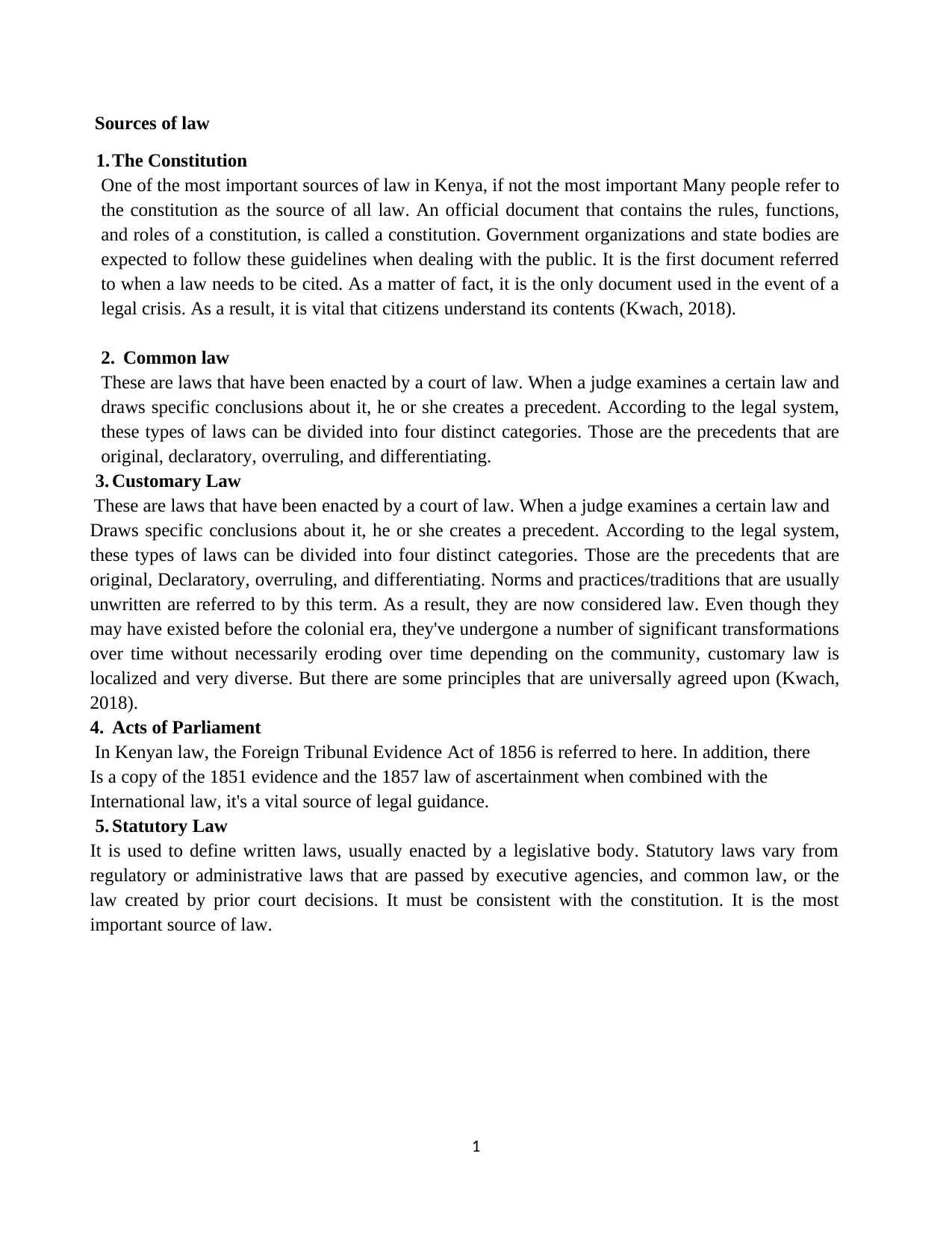
Sources of law
1. The Constitution
One of the most important sources of law in Kenya, if not the most important Many people refer to
the constitution as the source of all law. An official document that contains the rules, functions,
and roles of a constitution, is called a constitution. Government organizations and state bodies are
expected to follow these guidelines when dealing with the public. It is the first document referred
to when a law needs to be cited. As a matter of fact, it is the only document used in the event of a
legal crisis. As a result, it is vital that citizens understand its contents (Kwach, 2018).
2. Common law
These are laws that have been enacted by a court of law. When a judge examines a certain law and
draws specific conclusions about it, he or she creates a precedent. According to the legal system,
these types of laws can be divided into four distinct categories. Those are the precedents that are
original, declaratory, overruling, and differentiating.
3. Customary Law
These are laws that have been enacted by a court of law. When a judge examines a certain law and
Draws specific conclusions about it, he or she creates a precedent. According to the legal system,
these types of laws can be divided into four distinct categories. Those are the precedents that are
original, Declaratory, overruling, and differentiating. Norms and practices/traditions that are usually
unwritten are referred to by this term. As a result, they are now considered law. Even though they
may have existed before the colonial era, they've undergone a number of significant transformations
over time without necessarily eroding over time depending on the community, customary law is
localized and very diverse. But there are some principles that are universally agreed upon (Kwach,
2018).
4. Acts of Parliament
In Kenyan law, the Foreign Tribunal Evidence Act of 1856 is referred to here. In addition, there
Is a copy of the 1851 evidence and the 1857 law of ascertainment when combined with the
International law, it's a vital source of legal guidance.
5. Statutory Law
It is used to define written laws, usually enacted by a legislative body. Statutory laws vary from
regulatory or administrative laws that are passed by executive agencies, and common law, or the
law created by prior court decisions. It must be consistent with the constitution. It is the most
important source of law.
1
1. The Constitution
One of the most important sources of law in Kenya, if not the most important Many people refer to
the constitution as the source of all law. An official document that contains the rules, functions,
and roles of a constitution, is called a constitution. Government organizations and state bodies are
expected to follow these guidelines when dealing with the public. It is the first document referred
to when a law needs to be cited. As a matter of fact, it is the only document used in the event of a
legal crisis. As a result, it is vital that citizens understand its contents (Kwach, 2018).
2. Common law
These are laws that have been enacted by a court of law. When a judge examines a certain law and
draws specific conclusions about it, he or she creates a precedent. According to the legal system,
these types of laws can be divided into four distinct categories. Those are the precedents that are
original, declaratory, overruling, and differentiating.
3. Customary Law
These are laws that have been enacted by a court of law. When a judge examines a certain law and
Draws specific conclusions about it, he or she creates a precedent. According to the legal system,
these types of laws can be divided into four distinct categories. Those are the precedents that are
original, Declaratory, overruling, and differentiating. Norms and practices/traditions that are usually
unwritten are referred to by this term. As a result, they are now considered law. Even though they
may have existed before the colonial era, they've undergone a number of significant transformations
over time without necessarily eroding over time depending on the community, customary law is
localized and very diverse. But there are some principles that are universally agreed upon (Kwach,
2018).
4. Acts of Parliament
In Kenyan law, the Foreign Tribunal Evidence Act of 1856 is referred to here. In addition, there
Is a copy of the 1851 evidence and the 1857 law of ascertainment when combined with the
International law, it's a vital source of legal guidance.
5. Statutory Law
It is used to define written laws, usually enacted by a legislative body. Statutory laws vary from
regulatory or administrative laws that are passed by executive agencies, and common law, or the
law created by prior court decisions. It must be consistent with the constitution. It is the most
important source of law.
1
Paraphrase This Document
Need a fresh take? Get an instant paraphrase of this document with our AI Paraphraser
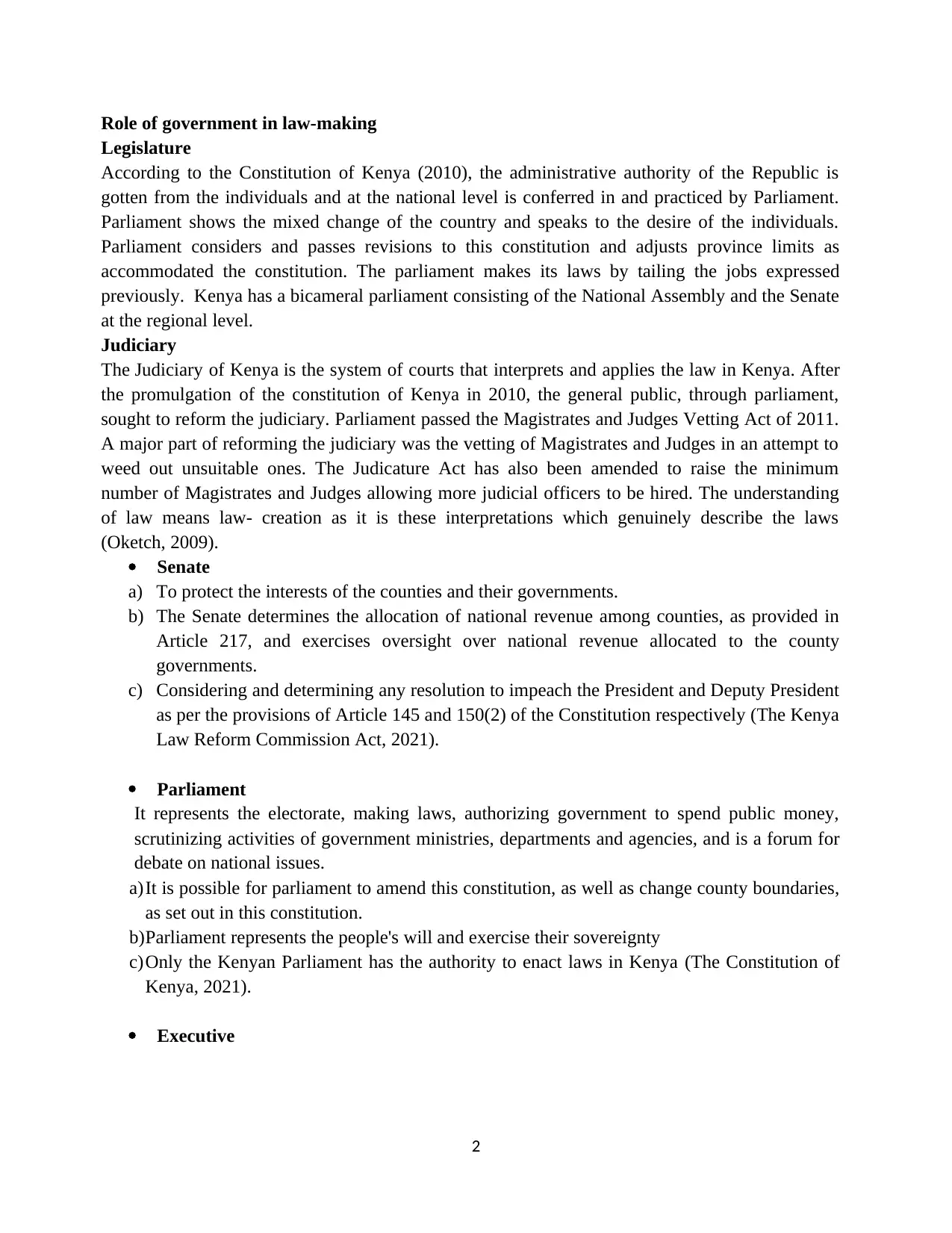
Role of government in law-making
Legislature
According to the Constitution of Kenya (2010), the administrative authority of the Republic is
gotten from the individuals and at the national level is conferred in and practiced by Parliament.
Parliament shows the mixed change of the country and speaks to the desire of the individuals.
Parliament considers and passes revisions to this constitution and adjusts province limits as
accommodated the constitution. The parliament makes its laws by tailing the jobs expressed
previously. Kenya has a bicameral parliament consisting of the National Assembly and the Senate
at the regional level.
Judiciary
The Judiciary of Kenya is the system of courts that interprets and applies the law in Kenya. After
the promulgation of the constitution of Kenya in 2010, the general public, through parliament,
sought to reform the judiciary. Parliament passed the Magistrates and Judges Vetting Act of 2011.
A major part of reforming the judiciary was the vetting of Magistrates and Judges in an attempt to
weed out unsuitable ones. The Judicature Act has also been amended to raise the minimum
number of Magistrates and Judges allowing more judicial officers to be hired. The understanding
of law means law- creation as it is these interpretations which genuinely describe the laws
(Oketch, 2009).
Senate
a) To protect the interests of the counties and their governments.
b) The Senate determines the allocation of national revenue among counties, as provided in
Article 217, and exercises oversight over national revenue allocated to the county
governments.
c) Considering and determining any resolution to impeach the President and Deputy President
as per the provisions of Article 145 and 150(2) of the Constitution respectively (The Kenya
Law Reform Commission Act, 2021).
Parliament
It represents the electorate, making laws, authorizing government to spend public money,
scrutinizing activities of government ministries, departments and agencies, and is a forum for
debate on national issues.
a)It is possible for parliament to amend this constitution, as well as change county boundaries,
as set out in this constitution.
b)Parliament represents the people's will and exercise their sovereignty
c)Only the Kenyan Parliament has the authority to enact laws in Kenya (The Constitution of
Kenya, 2021).
Executive
2
Legislature
According to the Constitution of Kenya (2010), the administrative authority of the Republic is
gotten from the individuals and at the national level is conferred in and practiced by Parliament.
Parliament shows the mixed change of the country and speaks to the desire of the individuals.
Parliament considers and passes revisions to this constitution and adjusts province limits as
accommodated the constitution. The parliament makes its laws by tailing the jobs expressed
previously. Kenya has a bicameral parliament consisting of the National Assembly and the Senate
at the regional level.
Judiciary
The Judiciary of Kenya is the system of courts that interprets and applies the law in Kenya. After
the promulgation of the constitution of Kenya in 2010, the general public, through parliament,
sought to reform the judiciary. Parliament passed the Magistrates and Judges Vetting Act of 2011.
A major part of reforming the judiciary was the vetting of Magistrates and Judges in an attempt to
weed out unsuitable ones. The Judicature Act has also been amended to raise the minimum
number of Magistrates and Judges allowing more judicial officers to be hired. The understanding
of law means law- creation as it is these interpretations which genuinely describe the laws
(Oketch, 2009).
Senate
a) To protect the interests of the counties and their governments.
b) The Senate determines the allocation of national revenue among counties, as provided in
Article 217, and exercises oversight over national revenue allocated to the county
governments.
c) Considering and determining any resolution to impeach the President and Deputy President
as per the provisions of Article 145 and 150(2) of the Constitution respectively (The Kenya
Law Reform Commission Act, 2021).
Parliament
It represents the electorate, making laws, authorizing government to spend public money,
scrutinizing activities of government ministries, departments and agencies, and is a forum for
debate on national issues.
a)It is possible for parliament to amend this constitution, as well as change county boundaries,
as set out in this constitution.
b)Parliament represents the people's will and exercise their sovereignty
c)Only the Kenyan Parliament has the authority to enact laws in Kenya (The Constitution of
Kenya, 2021).
Executive
2
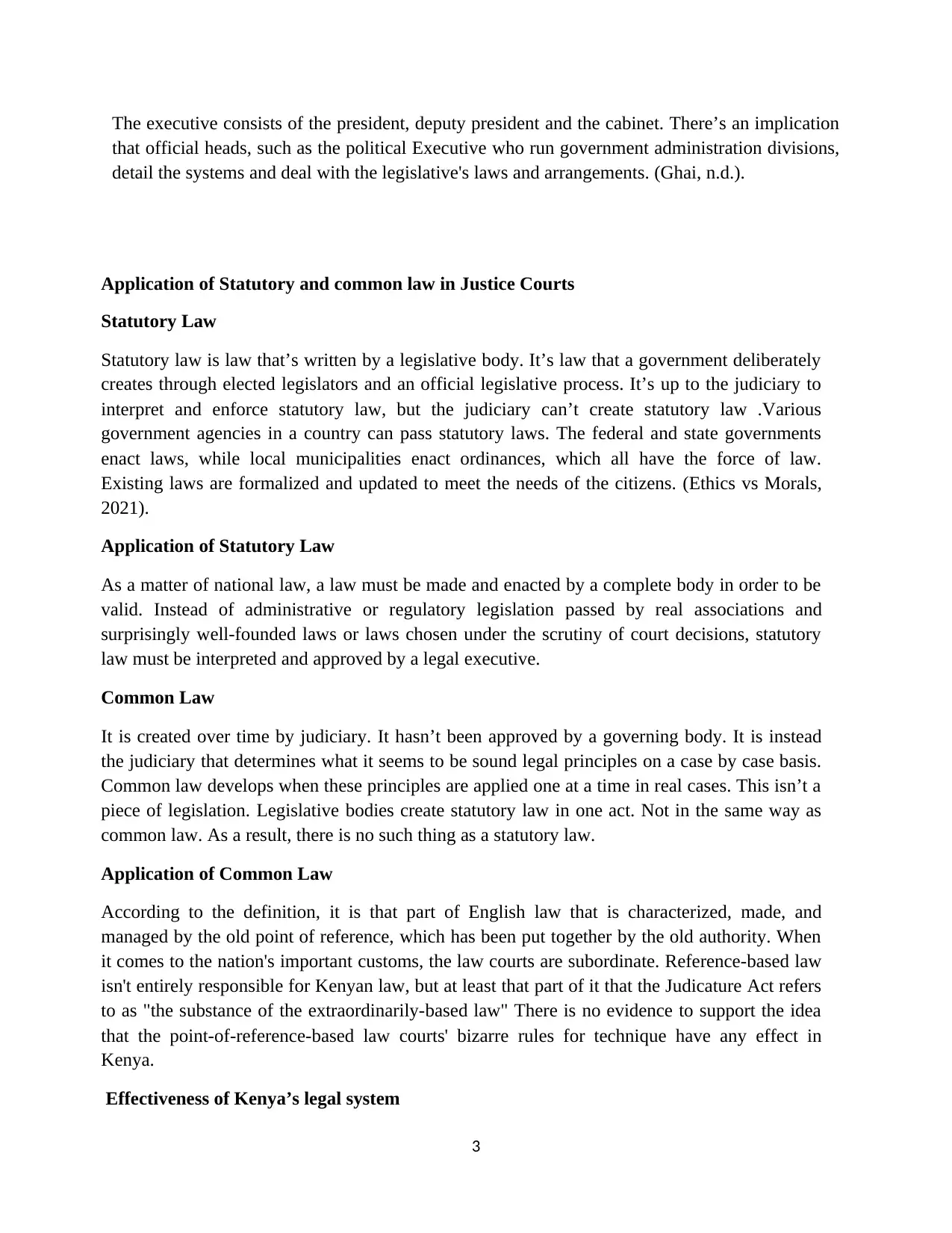
The executive consists of the president, deputy president and the cabinet. There’s an implication
that official heads, such as the political Executive who run government administration divisions,
detail the systems and deal with the legislative's laws and arrangements. (Ghai, n.d.).
Application of Statutory and common law in Justice Courts
Statutory Law
Statutory law is law that’s written by a legislative body. It’s law that a government deliberately
creates through elected legislators and an official legislative process. It’s up to the judiciary to
interpret and enforce statutory law, but the judiciary can’t create statutory law .Various
government agencies in a country can pass statutory laws. The federal and state governments
enact laws, while local municipalities enact ordinances, which all have the force of law.
Existing laws are formalized and updated to meet the needs of the citizens. (Ethics vs Morals,
2021).
Application of Statutory Law
As a matter of national law, a law must be made and enacted by a complete body in order to be
valid. Instead of administrative or regulatory legislation passed by real associations and
surprisingly well-founded laws or laws chosen under the scrutiny of court decisions, statutory
law must be interpreted and approved by a legal executive.
Common Law
It is created over time by judiciary. It hasn’t been approved by a governing body. It is instead
the judiciary that determines what it seems to be sound legal principles on a case by case basis.
Common law develops when these principles are applied one at a time in real cases. This isn’t a
piece of legislation. Legislative bodies create statutory law in one act. Not in the same way as
common law. As a result, there is no such thing as a statutory law.
Application of Common Law
According to the definition, it is that part of English law that is characterized, made, and
managed by the old point of reference, which has been put together by the old authority. When
it comes to the nation's important customs, the law courts are subordinate. Reference-based law
isn't entirely responsible for Kenyan law, but at least that part of it that the Judicature Act refers
to as "the substance of the extraordinarily-based law" There is no evidence to support the idea
that the point-of-reference-based law courts' bizarre rules for technique have any effect in
Kenya.
Effectiveness of Kenya’s legal system
3
that official heads, such as the political Executive who run government administration divisions,
detail the systems and deal with the legislative's laws and arrangements. (Ghai, n.d.).
Application of Statutory and common law in Justice Courts
Statutory Law
Statutory law is law that’s written by a legislative body. It’s law that a government deliberately
creates through elected legislators and an official legislative process. It’s up to the judiciary to
interpret and enforce statutory law, but the judiciary can’t create statutory law .Various
government agencies in a country can pass statutory laws. The federal and state governments
enact laws, while local municipalities enact ordinances, which all have the force of law.
Existing laws are formalized and updated to meet the needs of the citizens. (Ethics vs Morals,
2021).
Application of Statutory Law
As a matter of national law, a law must be made and enacted by a complete body in order to be
valid. Instead of administrative or regulatory legislation passed by real associations and
surprisingly well-founded laws or laws chosen under the scrutiny of court decisions, statutory
law must be interpreted and approved by a legal executive.
Common Law
It is created over time by judiciary. It hasn’t been approved by a governing body. It is instead
the judiciary that determines what it seems to be sound legal principles on a case by case basis.
Common law develops when these principles are applied one at a time in real cases. This isn’t a
piece of legislation. Legislative bodies create statutory law in one act. Not in the same way as
common law. As a result, there is no such thing as a statutory law.
Application of Common Law
According to the definition, it is that part of English law that is characterized, made, and
managed by the old point of reference, which has been put together by the old authority. When
it comes to the nation's important customs, the law courts are subordinate. Reference-based law
isn't entirely responsible for Kenyan law, but at least that part of it that the Judicature Act refers
to as "the substance of the extraordinarily-based law" There is no evidence to support the idea
that the point-of-reference-based law courts' bizarre rules for technique have any effect in
Kenya.
Effectiveness of Kenya’s legal system
3
⊘ This is a preview!⊘
Do you want full access?
Subscribe today to unlock all pages.

Trusted by 1+ million students worldwide
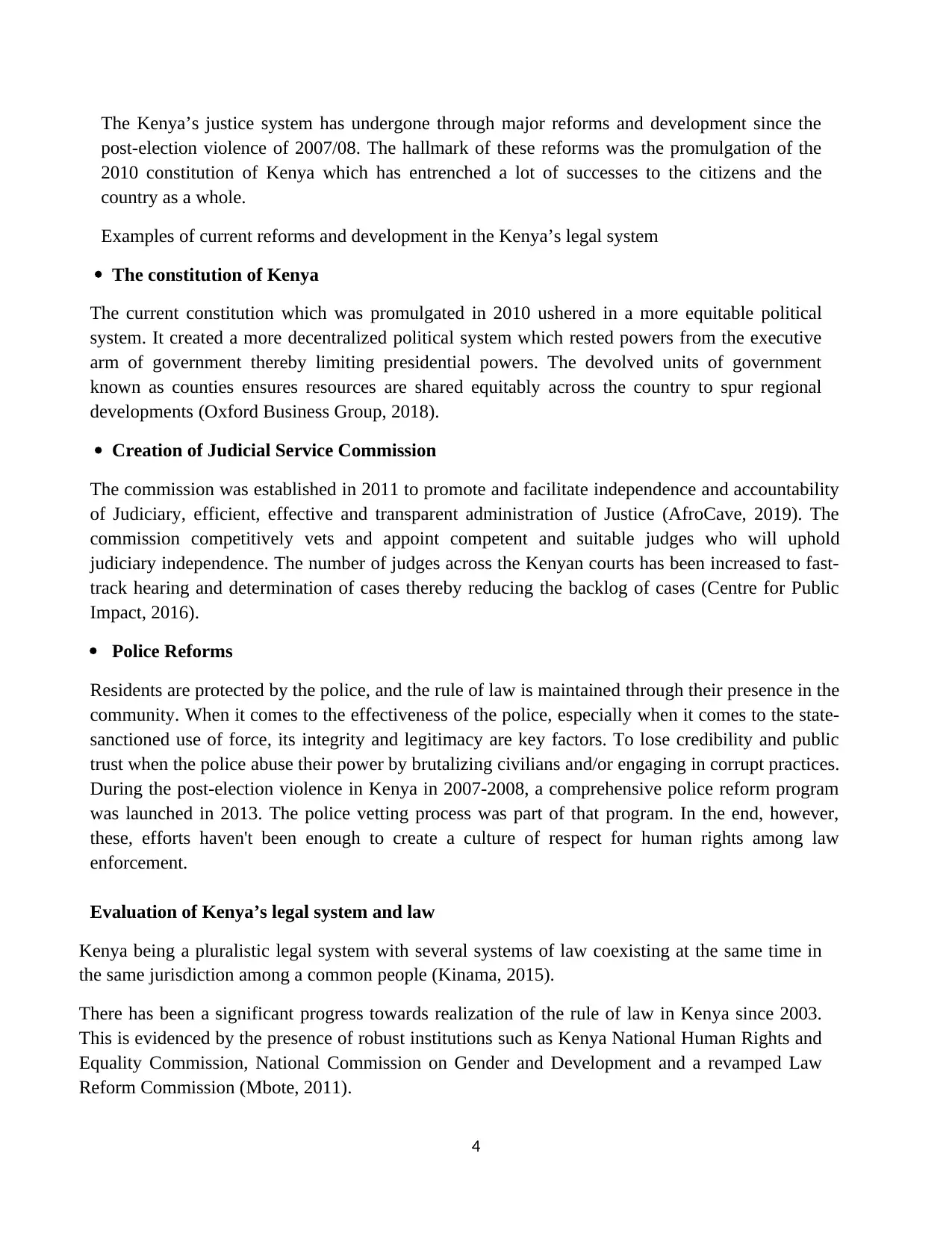
The Kenya’s justice system has undergone through major reforms and development since the
post-election violence of 2007/08. The hallmark of these reforms was the promulgation of the
2010 constitution of Kenya which has entrenched a lot of successes to the citizens and the
country as a whole.
Examples of current reforms and development in the Kenya’s legal system
The constitution of Kenya
The current constitution which was promulgated in 2010 ushered in a more equitable political
system. It created a more decentralized political system which rested powers from the executive
arm of government thereby limiting presidential powers. The devolved units of government
known as counties ensures resources are shared equitably across the country to spur regional
developments (Oxford Business Group, 2018).
Creation of Judicial Service Commission
The commission was established in 2011 to promote and facilitate independence and accountability
of Judiciary, efficient, effective and transparent administration of Justice (AfroCave, 2019). The
commission competitively vets and appoint competent and suitable judges who will uphold
judiciary independence. The number of judges across the Kenyan courts has been increased to fast-
track hearing and determination of cases thereby reducing the backlog of cases (Centre for Public
Impact, 2016).
Police Reforms
Residents are protected by the police, and the rule of law is maintained through their presence in the
community. When it comes to the effectiveness of the police, especially when it comes to the state-
sanctioned use of force, its integrity and legitimacy are key factors. To lose credibility and public
trust when the police abuse their power by brutalizing civilians and/or engaging in corrupt practices.
During the post-election violence in Kenya in 2007-2008, a comprehensive police reform program
was launched in 2013. The police vetting process was part of that program. In the end, however,
these, efforts haven't been enough to create a culture of respect for human rights among law
enforcement.
Evaluation of Kenya’s legal system and law
Kenya being a pluralistic legal system with several systems of law coexisting at the same time in
the same jurisdiction among a common people (Kinama, 2015).
There has been a significant progress towards realization of the rule of law in Kenya since 2003.
This is evidenced by the presence of robust institutions such as Kenya National Human Rights and
Equality Commission, National Commission on Gender and Development and a revamped Law
Reform Commission (Mbote, 2011).
4
post-election violence of 2007/08. The hallmark of these reforms was the promulgation of the
2010 constitution of Kenya which has entrenched a lot of successes to the citizens and the
country as a whole.
Examples of current reforms and development in the Kenya’s legal system
The constitution of Kenya
The current constitution which was promulgated in 2010 ushered in a more equitable political
system. It created a more decentralized political system which rested powers from the executive
arm of government thereby limiting presidential powers. The devolved units of government
known as counties ensures resources are shared equitably across the country to spur regional
developments (Oxford Business Group, 2018).
Creation of Judicial Service Commission
The commission was established in 2011 to promote and facilitate independence and accountability
of Judiciary, efficient, effective and transparent administration of Justice (AfroCave, 2019). The
commission competitively vets and appoint competent and suitable judges who will uphold
judiciary independence. The number of judges across the Kenyan courts has been increased to fast-
track hearing and determination of cases thereby reducing the backlog of cases (Centre for Public
Impact, 2016).
Police Reforms
Residents are protected by the police, and the rule of law is maintained through their presence in the
community. When it comes to the effectiveness of the police, especially when it comes to the state-
sanctioned use of force, its integrity and legitimacy are key factors. To lose credibility and public
trust when the police abuse their power by brutalizing civilians and/or engaging in corrupt practices.
During the post-election violence in Kenya in 2007-2008, a comprehensive police reform program
was launched in 2013. The police vetting process was part of that program. In the end, however,
these, efforts haven't been enough to create a culture of respect for human rights among law
enforcement.
Evaluation of Kenya’s legal system and law
Kenya being a pluralistic legal system with several systems of law coexisting at the same time in
the same jurisdiction among a common people (Kinama, 2015).
There has been a significant progress towards realization of the rule of law in Kenya since 2003.
This is evidenced by the presence of robust institutions such as Kenya National Human Rights and
Equality Commission, National Commission on Gender and Development and a revamped Law
Reform Commission (Mbote, 2011).
4
Paraphrase This Document
Need a fresh take? Get an instant paraphrase of this document with our AI Paraphraser
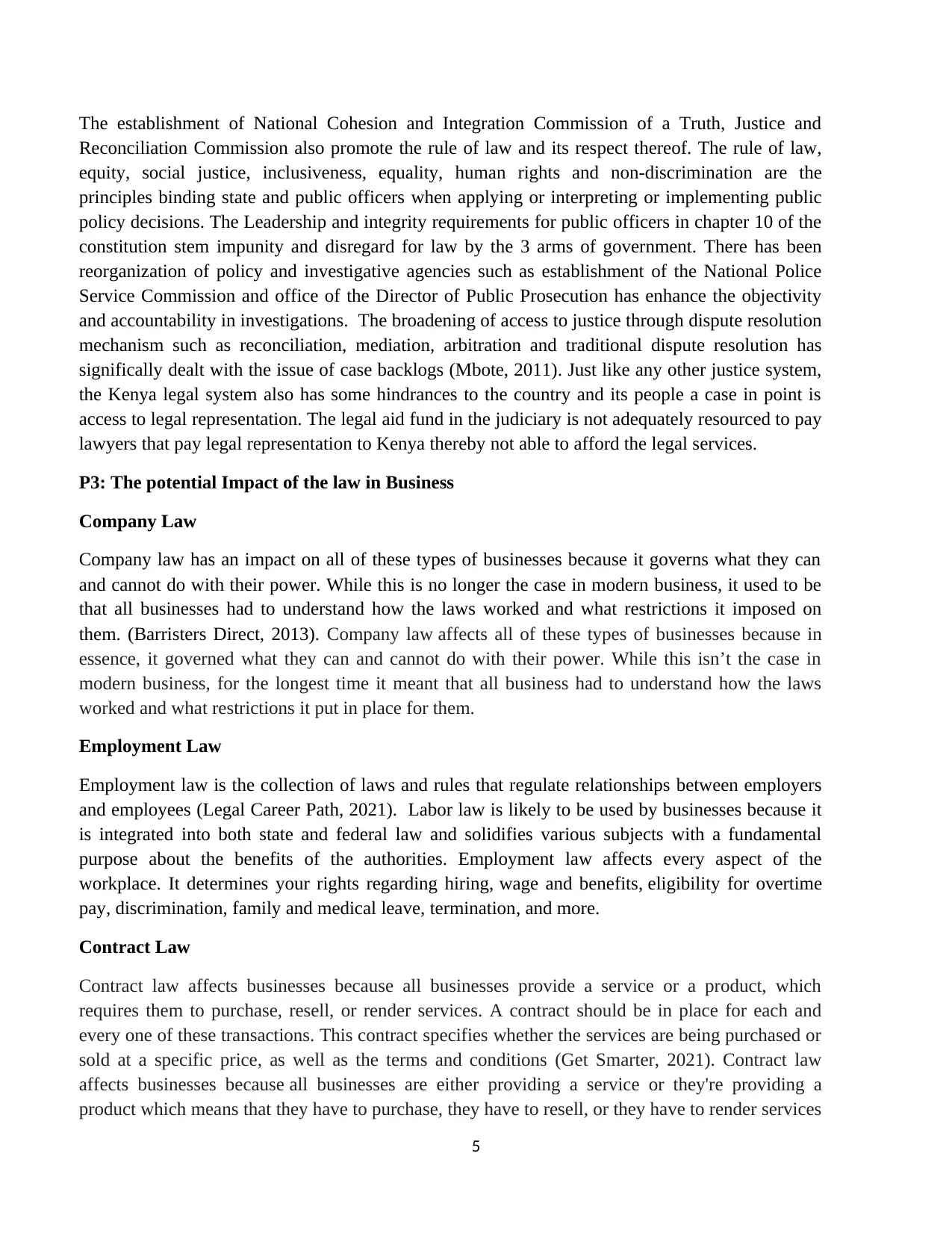
The establishment of National Cohesion and Integration Commission of a Truth, Justice and
Reconciliation Commission also promote the rule of law and its respect thereof. The rule of law,
equity, social justice, inclusiveness, equality, human rights and non-discrimination are the
principles binding state and public officers when applying or interpreting or implementing public
policy decisions. The Leadership and integrity requirements for public officers in chapter 10 of the
constitution stem impunity and disregard for law by the 3 arms of government. There has been
reorganization of policy and investigative agencies such as establishment of the National Police
Service Commission and office of the Director of Public Prosecution has enhance the objectivity
and accountability in investigations. The broadening of access to justice through dispute resolution
mechanism such as reconciliation, mediation, arbitration and traditional dispute resolution has
significally dealt with the issue of case backlogs (Mbote, 2011). Just like any other justice system,
the Kenya legal system also has some hindrances to the country and its people a case in point is
access to legal representation. The legal aid fund in the judiciary is not adequately resourced to pay
lawyers that pay legal representation to Kenya thereby not able to afford the legal services.
P3: The potential Impact of the law in Business
Company Law
Company law has an impact on all of these types of businesses because it governs what they can
and cannot do with their power. While this is no longer the case in modern business, it used to be
that all businesses had to understand how the laws worked and what restrictions it imposed on
them. (Barristers Direct, 2013). Company law affects all of these types of businesses because in
essence, it governed what they can and cannot do with their power. While this isn’t the case in
modern business, for the longest time it meant that all business had to understand how the laws
worked and what restrictions it put in place for them.
Employment Law
Employment law is the collection of laws and rules that regulate relationships between employers
and employees (Legal Career Path, 2021). Labor law is likely to be used by businesses because it
is integrated into both state and federal law and solidifies various subjects with a fundamental
purpose about the benefits of the authorities. Employment law affects every aspect of the
workplace. It determines your rights regarding hiring, wage and benefits, eligibility for overtime
pay, discrimination, family and medical leave, termination, and more.
Contract Law
Contract law affects businesses because all businesses provide a service or a product, which
requires them to purchase, resell, or render services. A contract should be in place for each and
every one of these transactions. This contract specifies whether the services are being purchased or
sold at a specific price, as well as the terms and conditions (Get Smarter, 2021). Contract law
affects businesses because all businesses are either providing a service or they're providing a
product which means that they have to purchase, they have to resell, or they have to render services
5
Reconciliation Commission also promote the rule of law and its respect thereof. The rule of law,
equity, social justice, inclusiveness, equality, human rights and non-discrimination are the
principles binding state and public officers when applying or interpreting or implementing public
policy decisions. The Leadership and integrity requirements for public officers in chapter 10 of the
constitution stem impunity and disregard for law by the 3 arms of government. There has been
reorganization of policy and investigative agencies such as establishment of the National Police
Service Commission and office of the Director of Public Prosecution has enhance the objectivity
and accountability in investigations. The broadening of access to justice through dispute resolution
mechanism such as reconciliation, mediation, arbitration and traditional dispute resolution has
significally dealt with the issue of case backlogs (Mbote, 2011). Just like any other justice system,
the Kenya legal system also has some hindrances to the country and its people a case in point is
access to legal representation. The legal aid fund in the judiciary is not adequately resourced to pay
lawyers that pay legal representation to Kenya thereby not able to afford the legal services.
P3: The potential Impact of the law in Business
Company Law
Company law has an impact on all of these types of businesses because it governs what they can
and cannot do with their power. While this is no longer the case in modern business, it used to be
that all businesses had to understand how the laws worked and what restrictions it imposed on
them. (Barristers Direct, 2013). Company law affects all of these types of businesses because in
essence, it governed what they can and cannot do with their power. While this isn’t the case in
modern business, for the longest time it meant that all business had to understand how the laws
worked and what restrictions it put in place for them.
Employment Law
Employment law is the collection of laws and rules that regulate relationships between employers
and employees (Legal Career Path, 2021). Labor law is likely to be used by businesses because it
is integrated into both state and federal law and solidifies various subjects with a fundamental
purpose about the benefits of the authorities. Employment law affects every aspect of the
workplace. It determines your rights regarding hiring, wage and benefits, eligibility for overtime
pay, discrimination, family and medical leave, termination, and more.
Contract Law
Contract law affects businesses because all businesses provide a service or a product, which
requires them to purchase, resell, or render services. A contract should be in place for each and
every one of these transactions. This contract specifies whether the services are being purchased or
sold at a specific price, as well as the terms and conditions (Get Smarter, 2021). Contract law
affects businesses because all businesses are either providing a service or they're providing a
product which means that they have to purchase, they have to resell, or they have to render services
5

Legislation
Legislation is a law that has been established by a board or other administrative body, or by the
process by which it is enacted. Before it becomes law, the enactment is known as a bill and is
commonly referred to as an enactment. Legislation that creates new public bodies, such as the
Legal Services Commission and the Public Defender System, has an impact on businesses.
Consumer protection legislation that grants consumers rights. Businesses must comply with
government legislation, which entails a number of additional costs in terms of both time and
money. Some of these expenses are incurred as a result of the time required to create documents,
follow procedures, and ensure legal obligations are met. Profits can be increased by improving the
brand image, giving the company a better reputation, and increasing the amount of sales they
make. Furthermore, if a company acts ethically and within the law, employees are more likely to
work harder and stay with the company for a long time. (BBC, 2021).
Standard
A standard is essentially a definition, a cut-off, or a rule that is endorsed and checked for
consistency as the least bad standard by a genuine office or a competent or perceived body. The
guidelines are difficult to remove once they have been set up. Every day is a labor of love for
Guideline. A standard is a detailed explanation of how to make something safe, beneficial, and
flawless in the eyes of others. It can also make execution guarantees.
Regulation
The guideline is essentially a statute, but it does not derive its existence explicitly from an
administrative body's decision, but rather by definition. The policy is routinely implemented by the
official branch of government. A meeting of the company's board of directors, for example, considers
a policy. The guideline has an outstanding component; its role must be derived from the standard.
Every guideline must have a standard that allows it to be implemented. Government regulations
influence how businesses structure themselves, where they choose to locate, how they classify their
employees, and thousands of other factors. Some of these regulations stand out and have a greater
impact on employers and their employees than others. It is critical that company executives are aware
of these regulations in order to conduct business effectively while remaining within the bounds of the
law (Feaman, 2007).
Types of business organizations
Sole proprietorship
A sole proprietorship is a type of business in which there is no legal distinction between the
business entity and its owner, and it is best suited to situations in which there is only one owner.
Because of their low initial costs, they are a popular choice for small businesses. Furthermore, any
generated income is taxed only once, as opposed to being taxed twice as a company and then again
as a personal source of income. In addition, they are subject to less taxation and regulation than
6
Legislation is a law that has been established by a board or other administrative body, or by the
process by which it is enacted. Before it becomes law, the enactment is known as a bill and is
commonly referred to as an enactment. Legislation that creates new public bodies, such as the
Legal Services Commission and the Public Defender System, has an impact on businesses.
Consumer protection legislation that grants consumers rights. Businesses must comply with
government legislation, which entails a number of additional costs in terms of both time and
money. Some of these expenses are incurred as a result of the time required to create documents,
follow procedures, and ensure legal obligations are met. Profits can be increased by improving the
brand image, giving the company a better reputation, and increasing the amount of sales they
make. Furthermore, if a company acts ethically and within the law, employees are more likely to
work harder and stay with the company for a long time. (BBC, 2021).
Standard
A standard is essentially a definition, a cut-off, or a rule that is endorsed and checked for
consistency as the least bad standard by a genuine office or a competent or perceived body. The
guidelines are difficult to remove once they have been set up. Every day is a labor of love for
Guideline. A standard is a detailed explanation of how to make something safe, beneficial, and
flawless in the eyes of others. It can also make execution guarantees.
Regulation
The guideline is essentially a statute, but it does not derive its existence explicitly from an
administrative body's decision, but rather by definition. The policy is routinely implemented by the
official branch of government. A meeting of the company's board of directors, for example, considers
a policy. The guideline has an outstanding component; its role must be derived from the standard.
Every guideline must have a standard that allows it to be implemented. Government regulations
influence how businesses structure themselves, where they choose to locate, how they classify their
employees, and thousands of other factors. Some of these regulations stand out and have a greater
impact on employers and their employees than others. It is critical that company executives are aware
of these regulations in order to conduct business effectively while remaining within the bounds of the
law (Feaman, 2007).
Types of business organizations
Sole proprietorship
A sole proprietorship is a type of business in which there is no legal distinction between the
business entity and its owner, and it is best suited to situations in which there is only one owner.
Because of their low initial costs, they are a popular choice for small businesses. Furthermore, any
generated income is taxed only once, as opposed to being taxed twice as a company and then again
as a personal source of income. In addition, they are subject to less taxation and regulation than
6
⊘ This is a preview!⊘
Do you want full access?
Subscribe today to unlock all pages.

Trusted by 1+ million students worldwide
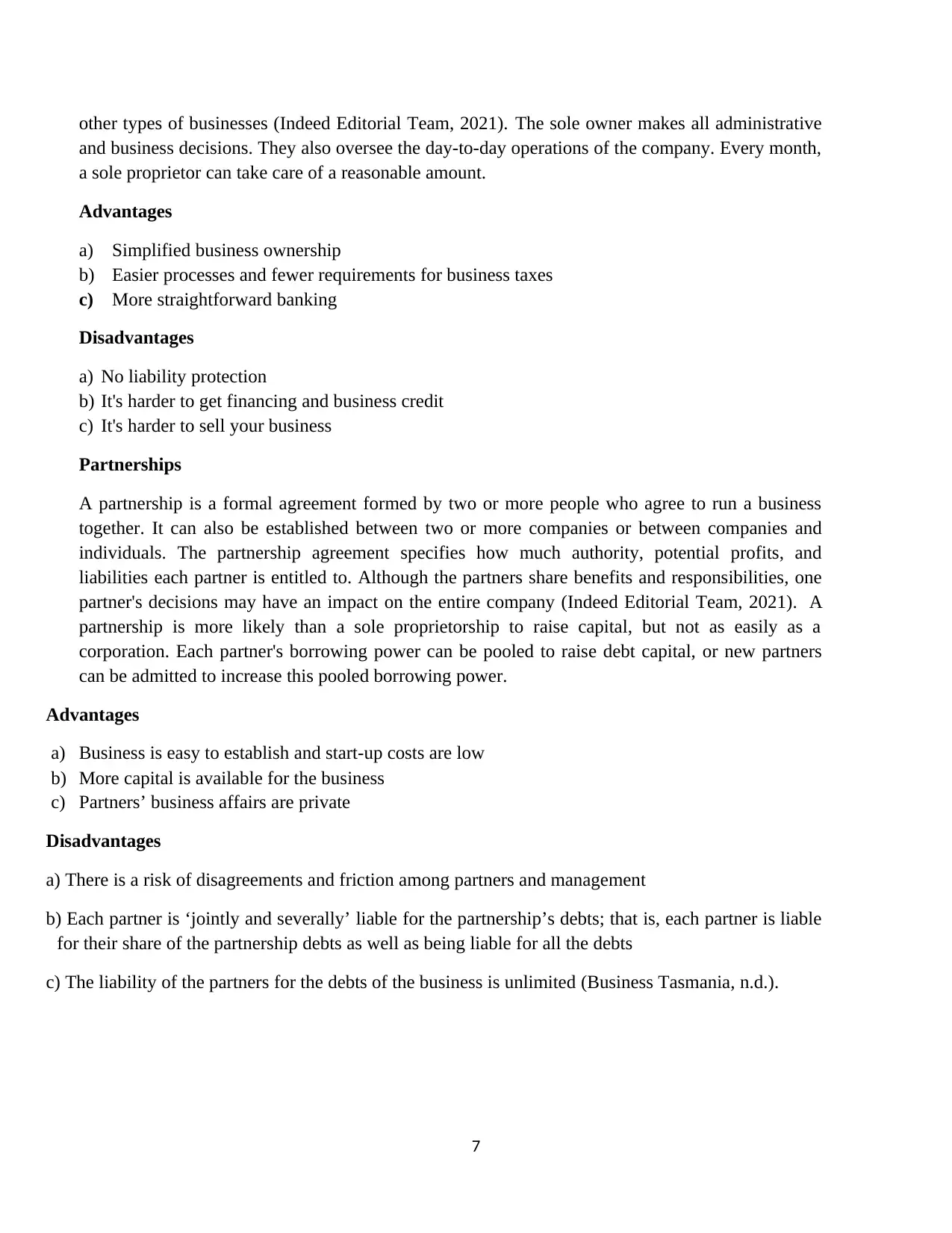
other types of businesses (Indeed Editorial Team, 2021). The sole owner makes all administrative
and business decisions. They also oversee the day-to-day operations of the company. Every month,
a sole proprietor can take care of a reasonable amount.
Advantages
a) Simplified business ownership
b) Easier processes and fewer requirements for business taxes
c) More straightforward banking
Disadvantages
a) No liability protection
b) It's harder to get financing and business credit
c) It's harder to sell your business
Partnerships
A partnership is a formal agreement formed by two or more people who agree to run a business
together. It can also be established between two or more companies or between companies and
individuals. The partnership agreement specifies how much authority, potential profits, and
liabilities each partner is entitled to. Although the partners share benefits and responsibilities, one
partner's decisions may have an impact on the entire company (Indeed Editorial Team, 2021). A
partnership is more likely than a sole proprietorship to raise capital, but not as easily as a
corporation. Each partner's borrowing power can be pooled to raise debt capital, or new partners
can be admitted to increase this pooled borrowing power.
Advantages
a) Business is easy to establish and start-up costs are low
b) More capital is available for the business
c) Partners’ business affairs are private
Disadvantages
a) There is a risk of disagreements and friction among partners and management
b) Each partner is ‘jointly and severally’ liable for the partnership’s debts; that is, each partner is liable
for their share of the partnership debts as well as being liable for all the debts
c) The liability of the partners for the debts of the business is unlimited (Business Tasmania, n.d.).
7
and business decisions. They also oversee the day-to-day operations of the company. Every month,
a sole proprietor can take care of a reasonable amount.
Advantages
a) Simplified business ownership
b) Easier processes and fewer requirements for business taxes
c) More straightforward banking
Disadvantages
a) No liability protection
b) It's harder to get financing and business credit
c) It's harder to sell your business
Partnerships
A partnership is a formal agreement formed by two or more people who agree to run a business
together. It can also be established between two or more companies or between companies and
individuals. The partnership agreement specifies how much authority, potential profits, and
liabilities each partner is entitled to. Although the partners share benefits and responsibilities, one
partner's decisions may have an impact on the entire company (Indeed Editorial Team, 2021). A
partnership is more likely than a sole proprietorship to raise capital, but not as easily as a
corporation. Each partner's borrowing power can be pooled to raise debt capital, or new partners
can be admitted to increase this pooled borrowing power.
Advantages
a) Business is easy to establish and start-up costs are low
b) More capital is available for the business
c) Partners’ business affairs are private
Disadvantages
a) There is a risk of disagreements and friction among partners and management
b) Each partner is ‘jointly and severally’ liable for the partnership’s debts; that is, each partner is liable
for their share of the partnership debts as well as being liable for all the debts
c) The liability of the partners for the debts of the business is unlimited (Business Tasmania, n.d.).
7
Paraphrase This Document
Need a fresh take? Get an instant paraphrase of this document with our AI Paraphraser
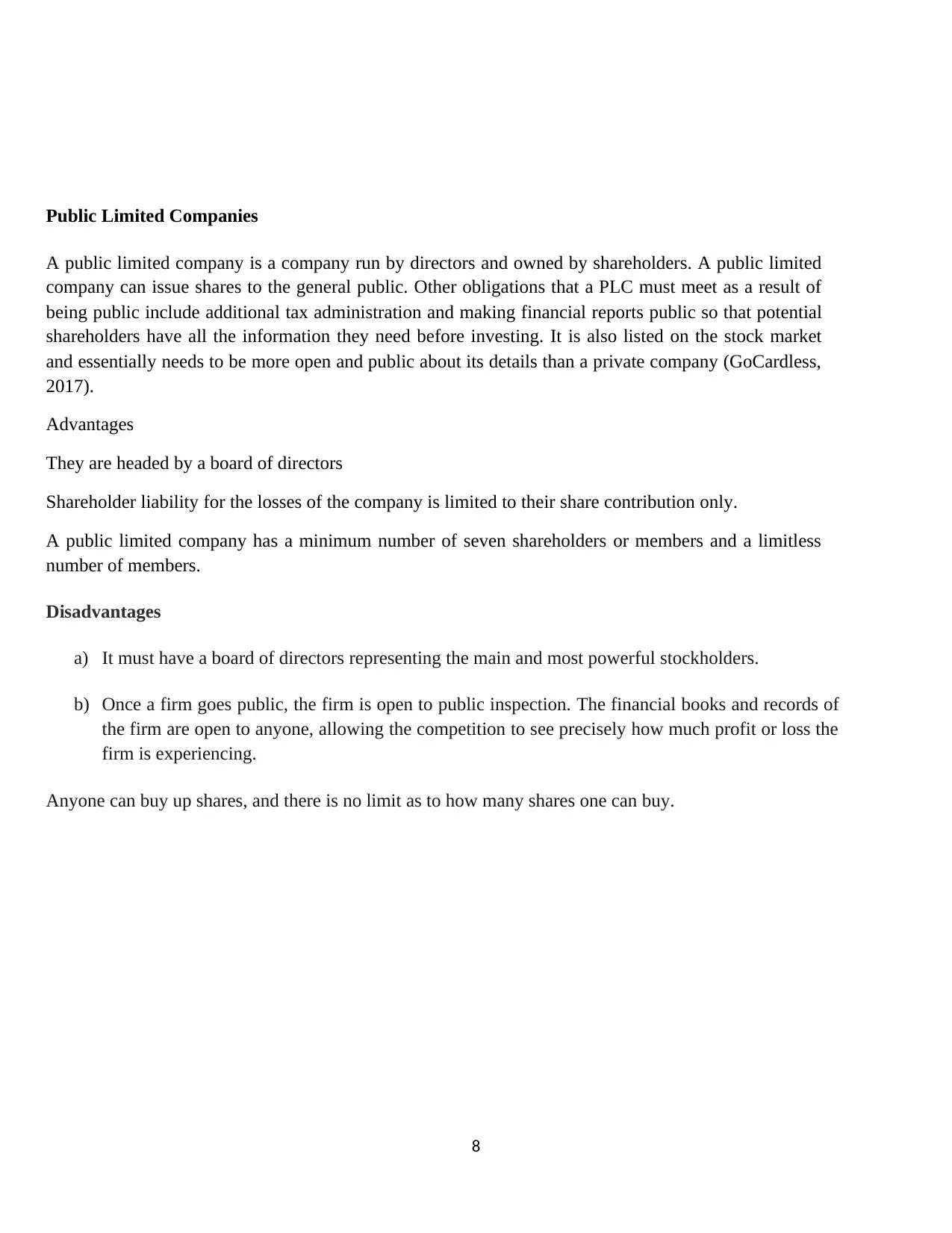
Public Limited Companies
A public limited company is a company run by directors and owned by shareholders. A public limited
company can issue shares to the general public. Other obligations that a PLC must meet as a result of
being public include additional tax administration and making financial reports public so that potential
shareholders have all the information they need before investing. It is also listed on the stock market
and essentially needs to be more open and public about its details than a private company (GoCardless,
2017).
Advantages
They are headed by a board of directors
Shareholder liability for the losses of the company is limited to their share contribution only.
A public limited company has a minimum number of seven shareholders or members and a limitless
number of members.
Disadvantages
a) It must have a board of directors representing the main and most powerful stockholders.
b) Once a firm goes public, the firm is open to public inspection. The financial books and records of
the firm are open to anyone, allowing the competition to see precisely how much profit or loss the
firm is experiencing.
Anyone can buy up shares, and there is no limit as to how many shares one can buy.
8
A public limited company is a company run by directors and owned by shareholders. A public limited
company can issue shares to the general public. Other obligations that a PLC must meet as a result of
being public include additional tax administration and making financial reports public so that potential
shareholders have all the information they need before investing. It is also listed on the stock market
and essentially needs to be more open and public about its details than a private company (GoCardless,
2017).
Advantages
They are headed by a board of directors
Shareholder liability for the losses of the company is limited to their share contribution only.
A public limited company has a minimum number of seven shareholders or members and a limitless
number of members.
Disadvantages
a) It must have a board of directors representing the main and most powerful stockholders.
b) Once a firm goes public, the firm is open to public inspection. The financial books and records of
the firm are open to anyone, allowing the competition to see precisely how much profit or loss the
firm is experiencing.
Anyone can buy up shares, and there is no limit as to how many shares one can buy.
8
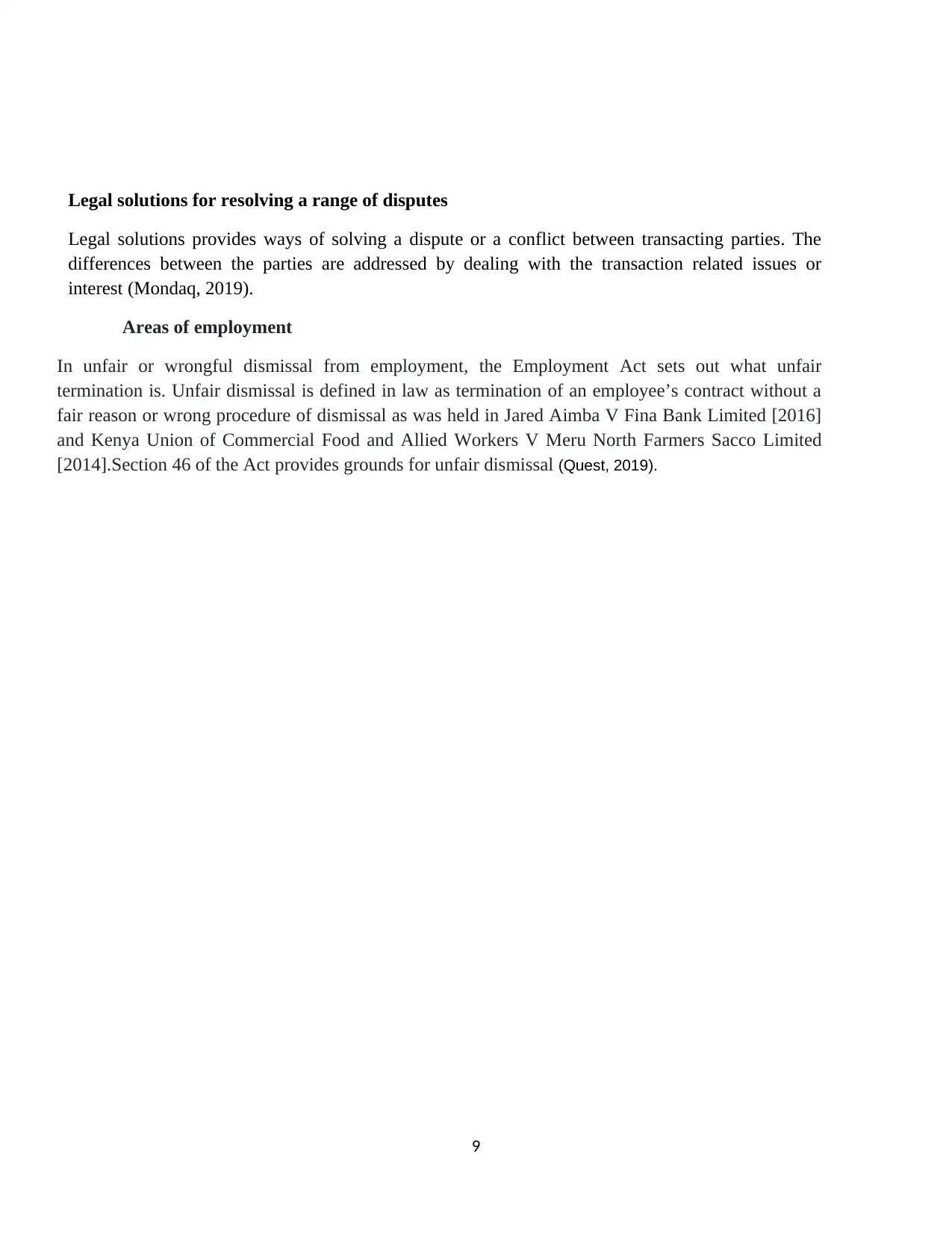
Legal solutions for resolving a range of disputes
Legal solutions provides ways of solving a dispute or a conflict between transacting parties. The
differences between the parties are addressed by dealing with the transaction related issues or
interest (Mondaq, 2019).
Areas of employment
In unfair or wrongful dismissal from employment, the Employment Act sets out what unfair
termination is. Unfair dismissal is defined in law as termination of an employee’s contract without a
fair reason or wrong procedure of dismissal as was held in Jared Aimba V Fina Bank Limited [2016]
and Kenya Union of Commercial Food and Allied Workers V Meru North Farmers Sacco Limited
[2014].Section 46 of the Act provides grounds for unfair dismissal (Quest, 2019).
9
Legal solutions provides ways of solving a dispute or a conflict between transacting parties. The
differences between the parties are addressed by dealing with the transaction related issues or
interest (Mondaq, 2019).
Areas of employment
In unfair or wrongful dismissal from employment, the Employment Act sets out what unfair
termination is. Unfair dismissal is defined in law as termination of an employee’s contract without a
fair reason or wrong procedure of dismissal as was held in Jared Aimba V Fina Bank Limited [2016]
and Kenya Union of Commercial Food and Allied Workers V Meru North Farmers Sacco Limited
[2014].Section 46 of the Act provides grounds for unfair dismissal (Quest, 2019).
9
⊘ This is a preview!⊘
Do you want full access?
Subscribe today to unlock all pages.

Trusted by 1+ million students worldwide
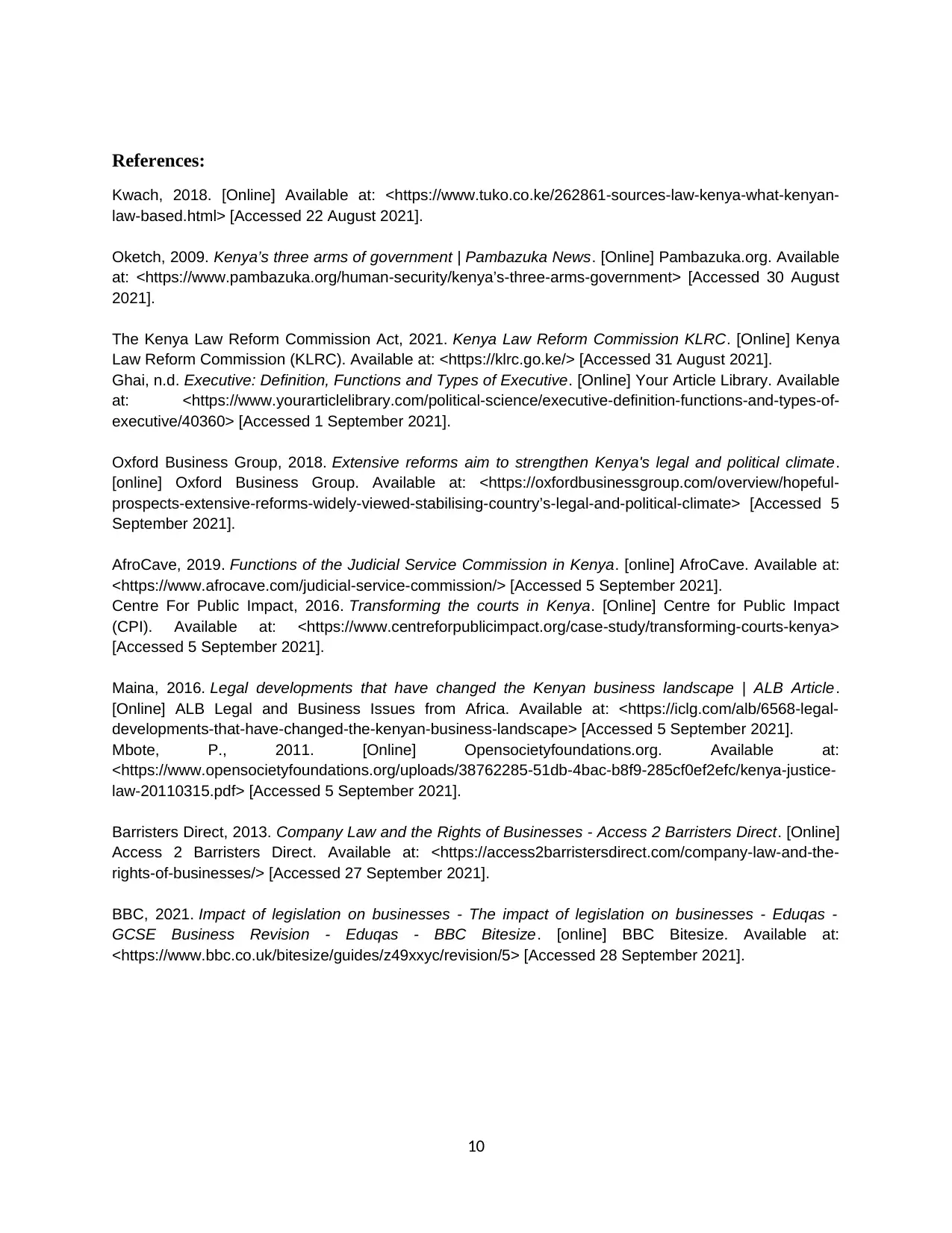
References:
Kwach, 2018. [Online] Available at: <https://www.tuko.co.ke/262861-sources-law-kenya-what-kenyan-
law-based.html> [Accessed 22 August 2021].
Oketch, 2009. Kenya’s three arms of government | Pambazuka News. [Online] Pambazuka.org. Available
at: <https://www.pambazuka.org/human-security/kenya’s-three-arms-government> [Accessed 30 August
2021].
The Kenya Law Reform Commission Act, 2021. Kenya Law Reform Commission KLRC. [Online] Kenya
Law Reform Commission (KLRC). Available at: <https://klrc.go.ke/> [Accessed 31 August 2021].
Ghai, n.d. Executive: Definition, Functions and Types of Executive. [Online] Your Article Library. Available
at: <https://www.yourarticlelibrary.com/political-science/executive-definition-functions-and-types-of-
executive/40360> [Accessed 1 September 2021].
Oxford Business Group, 2018. Extensive reforms aim to strengthen Kenya's legal and political climate.
[online] Oxford Business Group. Available at: <https://oxfordbusinessgroup.com/overview/hopeful-
prospects-extensive-reforms-widely-viewed-stabilising-country’s-legal-and-political-climate> [Accessed 5
September 2021].
AfroCave, 2019. Functions of the Judicial Service Commission in Kenya. [online] AfroCave. Available at:
<https://www.afrocave.com/judicial-service-commission/> [Accessed 5 September 2021].
Centre For Public Impact, 2016. Transforming the courts in Kenya. [Online] Centre for Public Impact
(CPI). Available at: <https://www.centreforpublicimpact.org/case-study/transforming-courts-kenya>
[Accessed 5 September 2021].
Maina, 2016. Legal developments that have changed the Kenyan business landscape | ALB Article.
[Online] ALB Legal and Business Issues from Africa. Available at: <https://iclg.com/alb/6568-legal-
developments-that-have-changed-the-kenyan-business-landscape> [Accessed 5 September 2021].
Mbote, P., 2011. [Online] Opensocietyfoundations.org. Available at:
<https://www.opensocietyfoundations.org/uploads/38762285-51db-4bac-b8f9-285cf0ef2efc/kenya-justice-
law-20110315.pdf> [Accessed 5 September 2021].
Barristers Direct, 2013. Company Law and the Rights of Businesses - Access 2 Barristers Direct. [Online]
Access 2 Barristers Direct. Available at: <https://access2barristersdirect.com/company-law-and-the-
rights-of-businesses/> [Accessed 27 September 2021].
BBC, 2021. Impact of legislation on businesses - The impact of legislation on businesses - Eduqas -
GCSE Business Revision - Eduqas - BBC Bitesize. [online] BBC Bitesize. Available at:
<https://www.bbc.co.uk/bitesize/guides/z49xxyc/revision/5> [Accessed 28 September 2021].
10
Kwach, 2018. [Online] Available at: <https://www.tuko.co.ke/262861-sources-law-kenya-what-kenyan-
law-based.html> [Accessed 22 August 2021].
Oketch, 2009. Kenya’s three arms of government | Pambazuka News. [Online] Pambazuka.org. Available
at: <https://www.pambazuka.org/human-security/kenya’s-three-arms-government> [Accessed 30 August
2021].
The Kenya Law Reform Commission Act, 2021. Kenya Law Reform Commission KLRC. [Online] Kenya
Law Reform Commission (KLRC). Available at: <https://klrc.go.ke/> [Accessed 31 August 2021].
Ghai, n.d. Executive: Definition, Functions and Types of Executive. [Online] Your Article Library. Available
at: <https://www.yourarticlelibrary.com/political-science/executive-definition-functions-and-types-of-
executive/40360> [Accessed 1 September 2021].
Oxford Business Group, 2018. Extensive reforms aim to strengthen Kenya's legal and political climate.
[online] Oxford Business Group. Available at: <https://oxfordbusinessgroup.com/overview/hopeful-
prospects-extensive-reforms-widely-viewed-stabilising-country’s-legal-and-political-climate> [Accessed 5
September 2021].
AfroCave, 2019. Functions of the Judicial Service Commission in Kenya. [online] AfroCave. Available at:
<https://www.afrocave.com/judicial-service-commission/> [Accessed 5 September 2021].
Centre For Public Impact, 2016. Transforming the courts in Kenya. [Online] Centre for Public Impact
(CPI). Available at: <https://www.centreforpublicimpact.org/case-study/transforming-courts-kenya>
[Accessed 5 September 2021].
Maina, 2016. Legal developments that have changed the Kenyan business landscape | ALB Article.
[Online] ALB Legal and Business Issues from Africa. Available at: <https://iclg.com/alb/6568-legal-
developments-that-have-changed-the-kenyan-business-landscape> [Accessed 5 September 2021].
Mbote, P., 2011. [Online] Opensocietyfoundations.org. Available at:
<https://www.opensocietyfoundations.org/uploads/38762285-51db-4bac-b8f9-285cf0ef2efc/kenya-justice-
law-20110315.pdf> [Accessed 5 September 2021].
Barristers Direct, 2013. Company Law and the Rights of Businesses - Access 2 Barristers Direct. [Online]
Access 2 Barristers Direct. Available at: <https://access2barristersdirect.com/company-law-and-the-
rights-of-businesses/> [Accessed 27 September 2021].
BBC, 2021. Impact of legislation on businesses - The impact of legislation on businesses - Eduqas -
GCSE Business Revision - Eduqas - BBC Bitesize. [online] BBC Bitesize. Available at:
<https://www.bbc.co.uk/bitesize/guides/z49xxyc/revision/5> [Accessed 28 September 2021].
10
1 out of 10
Related Documents
Your All-in-One AI-Powered Toolkit for Academic Success.
+13062052269
info@desklib.com
Available 24*7 on WhatsApp / Email
![[object Object]](/_next/static/media/star-bottom.7253800d.svg)
Unlock your academic potential
Copyright © 2020–2025 A2Z Services. All Rights Reserved. Developed and managed by ZUCOL.





